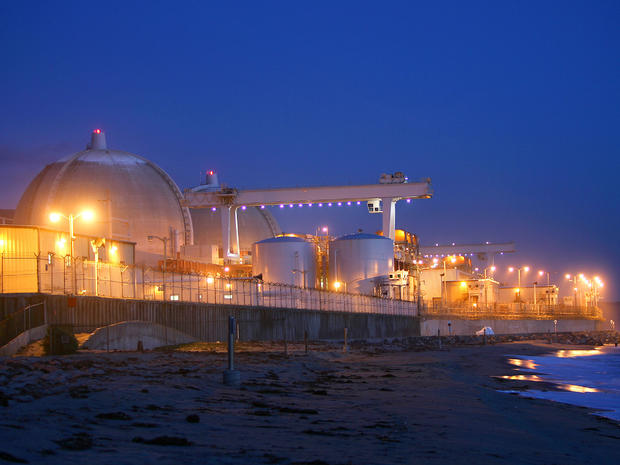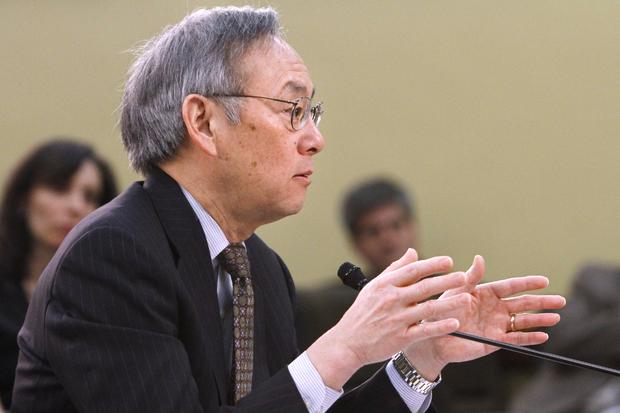Obama administration stands by nuclear power
Updated 5:00 p.m. Eastern Time
The Obama administration on Tuesday insisted that nuclear power plants in the United States are safe even as they kept an eye on the unfolding nuclear crisis in Japan.
"The American people should have full confidence that the United States has rigorous safety regulations in place to ensure that our nuclear power is generated safely and responsibly," Energy Secretary Steven Chu said in testimony before Congress.
The comments echo statements made by Gregory Jaczko, Chairman of the Nuclear Regulatory Commission, who told White House reporters Mondaythat "nuclear power plants in this country operate safety and securely."
President Obama, meanwhile, acknowledged the risk of nuclear power Tuesday, even as he said the country has a strong regulatory framework in place. He told CBS station KDKA that "nothing's completely failsafe, nothing is completely foolproof." (see video at left.)
Twenty percent of electricity in the United States is generated by nuclear power - twice as much as wind, solar and hydro power combined. For the Obama administration, the draw of nuclear power is tied to the fact that nuclear is by far the largest energy source that does not contribute to greenhouse gasses.
The crisis in Japan, however, is prompting questions about whether the energy is worth the risk. Twenty-three of the nuclear reactors in the United States use the same design as those found at the plant that failed in Japan, according to Dr. Ira Helfand, and every plant in the U.S. shares key design traits with the Japanese plant.
When it comes to earthquakes, plants are reinforced based on the region where they are built; if they are in an area more likely to experience significant seismic events, they will have stronger reinforcements. "We design so there will be no risk of significant release to surrounding populations," Chu said Tuesday.
The problem, critics say, is that there is always a chance that an extraordinary earthquake - one that significantly exceeds expectations - will hit, just as happened in Japan.
(At left, Professor Cham Dallas of the University of Georgia tells Katie Couric "the collapse of the simple things on the Japanese front does rattle my cage.")The two plants that have perhaps attracted the most attention for potential earthquake risks are in California: The Diablo Canyon and San Onofre plants, both of which are near Los Angeles - and both of which were built on what were later found to be earthquake fault lines. Pacific Gas and Electric, which owns Diablo Canyon, says the plant is built to withstand a 7.5 magnitude earthquake.
Daniel Hirsch, a lecturer in Nuclear Policy at the University of California Santa Cruz, noted that both plants had to be retrofitted after the faults were discovered after they had been built. He said a significant quake in the area could have devastating results.
"My own judgment is it's idiotic to place the amount of radioactivity that is in these reactors on an earthquake fault," he said in an interview, adding that he considered the presence of the facilities "insanity."
The Nuclear Energy Institute, a lobbying group to which nuclear plants have been referring reporters, sent CBS News a prepared document arguing that it's premature to draw conclusions from the disaster in Japan. The group argued that "the U.S. nuclear energy enterprise is built on a strong foundation."
"U.S. nuclear plant designs include consideration of seismic events and tsunamis," the group said. "It is important not to extrapolate earthquake and tsunami data from one location of the world to another when evaluating these natural hazards. These catastrophic natural events are very region- and location-specific, based on tectonic and geological fault line locations."
The group, whose lobbyists are now working the halls of Congress, added that "existing seismic design criteria are adequate."
One important note about the Japan crisis is that the earthquake itself did not appear to damage the plant; it seems to have been the subsequent tsunami that prompted the meltdown risk. The focus in the wake of that crisis may thus be on the tsunami risk facing plants in the United States positioned near the ocean.
On a conference call Thursday, experts with the Union of Concerned Scientists, a watchdog group, called on the Nuclear Regulatory Commission (NRC) to revisit rules around plant preparation for catastrophic events, including a plane crashing into a plant. They also called on the NRC to mandate that spent fuel rods be stored more safely and expressed concern that the nuclear industry is downplaying the disaster in Japan.
"Our main concern is that the industry here in the U.S. here and elsewhere doesn't try to whitewash the event - it is one of the most serious accidents to occur at a nuclear power plant in the history of nuclear industry," said Dr. Edwin Lyman, an expert on nuclear plant design.
The partial meltdown at Pennsylvania's Three Mile Island more than 30 years ago - combined with the Chernobyl disaster in 1986 - effectively halted construction on new nuclear plants for decades. That long period of inactivity had been coming to an end, with the Obama administration having agreed to a conditional loan agreement to build a new facility; the Nuclear Energy Institute says it expects planned plants in Georgia and South Carolina to proceed.
(At left, CBS News' John Blackstone reports on new concerns over U.S. plants operating in earthquake zones.)
Mike Paoli, a spokesperson for Energy Northwest, which runs a nuclear power plant in Washington state, said in an interview that he is "extremely confident" that the Energy Northwest plant is "100 percent safe."
"People know just enough about nuclear to fuel fears that are really unwarranted," he said, stressing that the Energy Northwest plant, Columbia Generating Station, is built to withstand an earthquake larger than the strongest expected to hit the area.
The Nuclear Energy Institute, meanwhile, said in its prepared document that it does not expect the U.S. nuclear industry to take a hit because of the tragedy in Japan.
"Given the safety record in this country, the robust regulatory infrastructure, the defense in depth that governs operations and designs, and the seismological differences between the U.S. and Japan," it said, "we believe that public support for nuclear power should not decline dramatically."
Complete Coverage: Disaster in Japan
Calif. nuke plant questions after Japan quake
Pacific Northwest "overdue" for major quake

